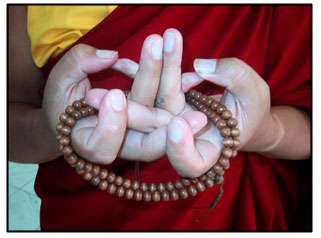Buddhist Studies:
Symbols/Iconography
Malas (Beads)

- Ritual Offering of beads
Beads are mainly used to count mantras, which can be recited for four different purposes:
- To appease,
- To increase,
- To overcome, or
- Tame by forceful means.
The beads used to count mantras intended to appease should be of crystal, pearl or mother of pearl, and should at least be clear or white in colour. A rosary for this purpose should have one hundred such beads. Mantras counted on these beads serve to clear away obstacles, such as illness and other calamities, and purify one of unwholesomeness.
The beads used with mantras intended to increase should be of gold, silver, copper or lotus seeds and a string of beads is made of 108 of them. The mantras counted on these serve to increase life span, knowledge and merit.
The beads used with mantras, which are intended to overcome, are made from a compound of ground sandal wood, saffron and other fragrant substances. There are twenty-five beads on this mala. The mantras counted on them are meant to tame others, but the motivation for doing so should be a pure wish to help other sentient beings and not to benefit oneself.
The beads used to recite mantras aiming at subduing beings through forceful means should be made from raksha seeds or human bones in a string of sixty. Again, as the purpose should be absolutely altruistic, the only person capable of performing such a feat is a Bodhisattva motivated by great compassion for a being who can be tamed through no other means, for example extremely malicious spirits, or general afflictions, visualized as a dense black ball.
Beads made of Bodhi seed or wood can be used for many purposes, for counting all kinds of mantras, as well as other prayers, prostrations, circumambulations and so forth.
The string common to all beads should consist of nine threads, which symbolize Buddha Vajradhara and the eight Bodhisattvas. The large bead at the end stands for the wisdom which cognises emptiness and the cylindrical bead surmounting it, emptiness itself, both symbolize having vanquished all opponents.

